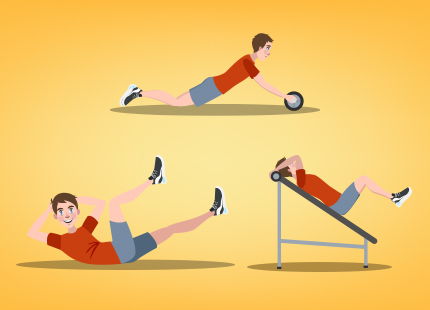How to Increase Muscle Size? Here are 9 ways.
- Increase Your Training Volume
Training volume—your number of reps multiplied by your number of sets—is a primary determiner of hypertrophy (aka how to grow muscle). And to increase volume, you may actually need to go lower in weight than you might guess.
To get the volume your muscles need, she recommends performing each of your lifts for three to six sets of 10 to 20 reps.
- Focus on the Eccentric Phase
When lifting any weight, you’ve got a concentric (hard) and eccentric (easy) phase. For instance, as you lower into a squat, you’re performing an eccentric action. When you return to standing, that’s concentric. And, according to research published in the European Journal of Applied Physiology, eccentric work is far better at triggering hypertrophy.
To increase the amount of eccentric effort in your workout, you can do two things: either slow down the eccentric phase of each exercise you perform or integrate eccentric-only variations into your routine.
- Decrease Between-Set Rest Intervals
If you touch your phone between exercise sets, it better be to set its timer to 30 to 90 seconds. When lifting for hypertrophy, rest periods of 30 to 90 seconds encourage a quick release in muscle-building hormones (including testosterone and human growth hormone) while also making sure that you really, truly fatigue your muscles.
- To Grow Muscle, Eat More Protein
Exercise training breaks down your muscles. Protein builds them back up. And the harder your lifting workouts, the more important of the muscle-building foods to consider is protein intake to solidify recovery, Fitzgerald explains.
- Focus on Calorie Surpluses, Not Deficits
This can be a hard one to get used to, especially for those who are used to counting calories in the hopes of losing weight. But to most effectively build muscle mass quickly (that means weight gained, not lost), you need to consume more calories than you burn each day.
That’s because, when your body senses that it’s in a calorie deficit—meaning you’re consuming fewer calories than you’re burning each day—it downshifts your body’s tendency to build new muscle. After all, if your body thinks food is in short supply, getting swole isn’t going to be its main priority.
- Snack on Casein Before Bed
Long popular among bodybuilders, casein protein absorbs slowly into the bloodstream, meaning it keeps your muscles fed with amino acids for longer compared to other types of protein such as whey and plant proteins. In one Medicine and Science in Sports and Exercise study, consuming casein protein immediately before bed boosted young men’s levels of circulating amino acids for 7.5 hours; they built muscle all night long while they slept.
To get some pre-bed casein, try cottage cheese, Greek yogurt, and milk. For smoothie lovers, casein-based protein powder works like a charm.
- Get More Sleep
Muscle recovery requires more than the right nutrition. It takes time—roughly eight hours per night—dedicated to recovery, Fitzgerald says. After all, when you sleep, your body releases human growth hormone, which helps grow muscle and keeps levels of the stress hormone cortisol in check.
Plus, according to a study in the Journal of the American Medical Association, sleeping for five hours, as opposed to eight hours, per night for just one week cuts muscle-building testosterone levels by a whopping 10 to 15 percent.
The National Sleep Foundation recommends that adults ages 18 to 64 sleep seven to nine hours per night. No excuses.
- Try Supplementing with Creatine...
Creatine doesn’t directly grow muscle. But by boosting your performances at high-intensity lifting workouts, the natural compound effectively promotes muscle growth, according to the Journal of the International Society of Sports Nutrition.
In fact, in one Journal of Strength and Conditioning Research review, researchers concluded that, at a given weight, supplementing with creatine can help you lift 14 percent more reps than you can sans supplements.
For the best results, opt for creatine monohydrate, the most thoroughly researched form of the supplement.
- ...and HMB
A natural compound produced in the human body, beta-hydroxy-beta-methylbutyrate prevents muscle-protein breakdown, encourages muscle growth, and speeds exercise recovery.
Unfortunately, it’s hard to significantly increase levels through food alone. That’s where supplementation comes in. For instance, in one 12-week study of resistance-trained individuals, taking HMB in tandem with a high-intensity lifting routine significantly improved muscle strength and size compared to lifting alone. Plus, in the off-chance that you push yourself too hard, HMB helps prevent the effects of overtraining—including muscle loss.








